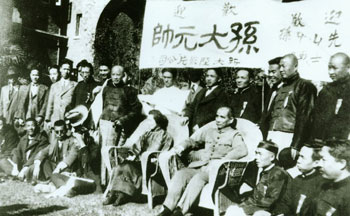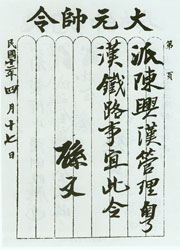Chen Xinghan

Group photo of Sun Yat-sen, Soong Ching-ling and Chen Xinghan (second from right in the back row), etc. in Shanghai

Generalissimo order by which Sun Yat-sen sent Chen Xinghan to manage the Yuehan Railway
Chen Xinghan was born in 1876, ten years younger than Sun Yat-sen, and lived next door to Sun Yat-sen.
In 1883, when 17-year-old Sun Yat-sen returned from Honolulu, he often told overseas news and corrupt practices of the Qing government to villagers. Chen, who was 7 then, was attracted by Sun’s extensive knowledge, and was often present towatch when Sun improved village governance and mobilized villagers to build roads.
Chen joined the Chinese Revolutionary League and took part in Sun’s revolutionary activities very early, but did not contact Sun frequently until the foundation of Republican China. In 1912, when the provisional government of Republican China was founded in China, Chen was appointed as secretary to the provisional president. On March 5 of the same year, he attended the memorialceremony of central Guangdong revolutionary martyrs in Nanjing together with Sun as the sponsor. Chen’s ability in logistics was given play to again when Sun Yat-sen establisheda regime in Guangzhou for the third time. On March 12, 1923, Chen was appointed as Head of the General Affairs Division of the Headquarters of the Generalissimo of Army and Navy by Sun Yat-sen, responsible for logistical support for the headquarters.
Another strength of Chen was railway management. On April 17, 1923, Sun Yat-sen appointed Chen as Supervisor of the Yuehan Railway. Two days later, Sun Yat-sen instructedto discuss and organizethe board of directors of Yuehan Railway Company again,and reaffirmed all affairs of the railway would be handled by Chen with full authority, because “Chen was appointedofficially, electedbythepublic,experienced and responsiblefor the job, thereforeweexpect himtobe flexible in work,better serve for the railway management andnot missany opportunity.” When he was in office, Chen balanced the interests of all warlords concerned to protect the railway from military interference, and improved its management to ensure smooth railway transport.
In April 1923, Chen was pointed as Director of the Railway Transport Bureau of the Ministry of Military Depot Supervision, and inspected the north railway facilities together with Sun Yat-sen, Chiang Kai-shek, etc. In February 1924,in order to brace up the solderswho fought bravely at the frontline to defend Guangzhou,Chen went to Jiangcun in the north suburb of Guangzhou together with Sun Yat-sen, Song Ziwen, Chen Youren, etc. to appreciate the Hunan army and inspected Lu Diping’s troop.
In January 1924, Chen was appointed as a member of and financialcounselor to the Finance Committee of the Generalissimo Mansion by Sun Yat-sen. In February 1924, Chen served as Director-general of the Guangsan Railway Authority and also as Director-general of the Guangjiu Railway Authority. Before taking office, Chen asked Sun Yat-sen to withdraw the appointment because he was busy with the management of the Yuehan Railway, but Sun did not agree, and said, “Chen is very good at railway management, and competenttoserve concurrently as Director-general of the Guangsan Railway Authority immediately because no one else is qualified.He should assume office immediately to reorganize the bureau and affairs. The request for withdrawal should be returned and will not be discussed again.”
On May 5, 1924, Chen became an executive member of the Guangzhou Special Committee of the Chinese Nationalist Party as nominated by Sun Yat-sen. On June 3, 1924, he was elected as Head of the Industry Department of the Guangzhou Special Committee. On October 5, 1924, Sun Yat-sen sent a telegraph reply to Chen, telling him the operational plan of the northern expedition, and said, “You should prepare the trains in advance or make arelated plan forthat.” After thebeginning of the Anti-Japanese War, Chen served as Director-general of the Beijing-Shanghai and Shanghai-Hangzhou-Ningbo Railways Authority, responsible specifically for smooth transporting of soldier and military materials to the frontlinewith all efforts and strength.

